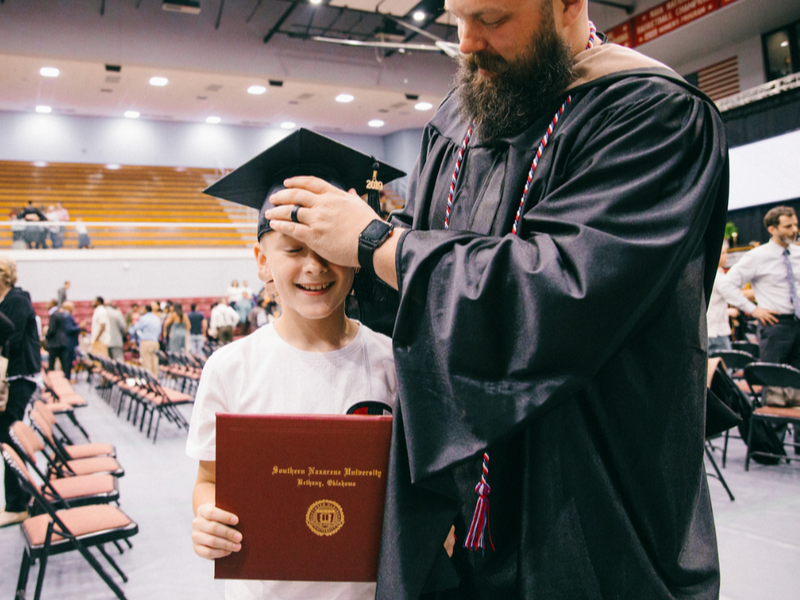-
Programs
Not Sure Where to Start?
- Associate Programs & Certificates
- General Studies
- Associate of Arts in Business
- Physical Therapist Assistant
- Professional Services & Certificates
- Special Education Bootcamp
- View All
- Undergraduate Programs
- Business Administration
- Criminal Justice
- Cybersecurity
- Education
- Family Studies and Gerontology
- Healthcare Administration
- Organizational Leadership
- Accelerated General Education
- View All
- Graduate & Doctorate Programs
- Doctorate of Education in Administration & Leadership
- M.A. Administration of Special Ed.
- M.A. Applied Psychology
- M.A. Educational Leadership
- M.A. Sports Management & Administration
- M.A. Teaching
- MBA, 12- 18 months
- MBA - Healthcare Administration
- Master of Organizational Leadership
- M.S. Counseling Psychology
- M.S. Exercise Science - Health & Human Performance
- M.S. Exercise Science - Wellness
- M.S. Instructional Design Technology
- M.S. Management
- M.S. Physician Assistant
- Alternative Certification (Teaching or Special Ed.)
- View All
- Resources
- Tuition & Aid
- Military
Concurrent Enrollment
-
Earn dual credit while still in high school.
-
Attend exclusively with other high school students.
-
Enjoy a safe and secure learning environment.

Welcome & Program Overview
Welcome to Southern Nazarene University's Concurrent College Credit Program! Concurrent enrollment allows high school students the opportunity to earn college credit while still in high school.
You can earn credits toward high school graduation and can also begin a degree pathway! As you explore your career interests, you can save on the overall cost of a future degree and make the most of your time in high school. Experiencing the rigor of college-level coursework also helps ease the transition to your next educational endeavor.
SNU's Concurrent Enrollment Program will be offered at the Tulsa campus in Tulsa, Oklahoma, where you will attend classes exclusively with other high school students rather than adult learners. In a five-week accelerated format, courses are offered face-to-face on Mondays and Wednesdays from 12:00 p.m. to 4:00 p.m. We are looking forward to serving you!
Would You Like to Know More?
For more information about SNU-Tulsa's Concurrent Program, please download our Enrollment Information Packet, or email Dr. Anne Ghost Bear. If you would like to schedule a tour, please call 918.664.4100 or email Prof. Virilyaih Scroggins.
Admissions
To participate in the Concurrent Enrollment program at SNU, students must be 14 years old by September 1 of the calendar year when they enroll and have a 2.0 or higher GPA. You can begin the process of enrollment by completing an application. After completing your application, you will be contacted by an enrollment counselor to submit additional materials, such as your transcript, proof of age, and GPA documentation.
A Note to Parents/Guardians: We encourage parents/guardians to allow their students the opportunity to complete their application to the university. This process is relatively straightforward, but the student must know their personal information. Enabling students to do this, with you sitting alongside, means that your student is taking a significant first step towards the independence and self-efficacy that being a successful college and high school student demands. Students should use their personal email accounts. If your student does not have an email account, there are several free options, such as Gmail and Yahoo.
Cost of Attendance
Students are ultimately responsible for the costs incurred by attending courses. Tuition cost for concurrent enrollment courses at SNU is $140 per credit hour/$420 per 3-credit hour course. To pay the tuition or set up a payment plan, please get in touch with Angelina Gallegos in our financial aid office.
Textbooks
SNU has committed to doing its part in expanding access to college. Textbooks will be available by free checkout/in or, if purchasing is preferable, you may do so with Amazon, Chegg, or another book purchasing service. Please see the Enrollment Information Packet or click the course names under courses below for textbook information and ISBN numbers. If you have additional questions about textbooks, please call 918.664.4100 or email Prof. Virilyaih Scroggins.
Courses
These courses prepare you for more than the practical duties of your future careers—they prepare you to enter the field as an insightful, well-rounded individual ready to make a difference. Review the courses and descriptions below for an in-depth understanding of learning outcomes and ISBN numbers for textbooks. Additional course offerings are coming soon!
Credit Hours: 3
A General Education course that develops writing skills through expressive and explanatory writing, often in the context of the student's own experiences.
Learning Outcomes
-
Identify various contexts for writing.
-
Analyze sources by identifying academic vs. non-academic writing, employing critical reading skills, effectively annotating texts, and demonstrating APA documentation of sources used for writing.
-
Accurately summarize, quote, and paraphrase texts.
-
Revise and edit writing using the Policy for Use of Edited Standard Written English (ESWE).
-
Evaluate a source using clearly identified, defensible criteria.
-
Obtain and synthesize appropriate evidence to construct thoughtful and coherent exchanges of information that are expressed and/or presented utilizing sound rhetorical and visual processes.
Textbooks
Ruszkiewicz, J., & Dolmage, J. T. (2021). How to write anything: A guide and reference with readings with 2020 APA Updates (5th ed). Bedford/St.Martin’s. ISBN: 9781319245030.
Credit Hours: 3
General Education course that continues to develop writing skills in more formal and academic contexts through practice in rhetoric, argumentation, and research.
Learning Outcomes
-
Summarize arguments effectively and efficiently
-
Grasp, analyze, and critique other people's arguments
-
Use various forms of argument in your reasoning and writing
-
Evaluate the usefulness and credibility of source material
-
Target arguments to real audiences
-
Efficiently research, using both print and electronic sources
-
Cite and document a wide range of source materials in APA formatting
-
Effectively use research and others' arguments in making your own argument
Textbooks (Same text as ENGL-1113)
- Ruszkiewicz, J., & Dolmage, J. T. (2021). How to write anything: A guide and reference with readings with 2020 APA Updates (5th ed). Bedford/St.Martin’s. ISBN: 9781319245030.
Credit Hours: 3
A beginning course which stresses that communication is an essential element of human existence. Basic communication theory, interpersonal skills, and public speaking skills are addressed.
Learning Outcomes
By the completion of this course and its requirements, students will be able to:
-
Articulate the basic components of interpersonal communication as they apply to the communication process in everyday interaction to increase personal effectiveness in communication with others.
-
Demonstrate the skills involved in public speaking, including organization and delivery, to produce effective informative speeches.
Textbooks
Other resources
Credit Hours: 3
This introductory course explores contemporary psychology as a science, profession, and means for promoting human wellness. Topics include psychology's philosophical and historical background, its predominant methodologies, and an overview of psychology's predominant subfields of study.
Learning Outcomes
- Identify fundamental knowledge and comprehension of the major concepts, theoretical perspectives, historical trends, empirical findings, and practical applications in psychology.
- Describe scientific reasoning and problem-solving skills that can be used to draw conclusions about psychological phenomena.
- Recognize ethically and socially responsible behaviors when working individually and on a team.
- Summarize and report psychological research findings.
- Apply psychology-specific content and skills to personal development, interpersonal communication, project management, and teamwork.
Textbooks
Lewis, T.H., Amini, F., & Lannon, R. (2001). A general theory of love. Penguin Random House. ISBN: 978-0-375-70922-7
This book is also required but provided via an Open Source website:
Kearns, T., & Lee, D. (2015). General psychology: An introduction. Retrieved February 17, 2021, from https://oer.galileo.usg.
Credit Hours: 3
A course in which students are introduced to how a Christian perspective creates and deepens meaning in cultural, personal, social, and aesthetic issues; how to evaluate moral and ethical choices in light of sound interpretations of Christian scriptures, Christian traditions, and the Wesleyan theological perspective; and how Christians operationalize that analysis through active stewardship and service.
Student Policies & Handbooks
Attendance
Class attendance is crucial. If you do not attend, you cannot earn a grade. Once registered, even if you do not attend, you will still be financially responsible for the class.
Continued Enrollment
Every college course will go on your transcript. These courses are permanently included as a part of your academic history. Students whose cumulative college GPA falls below 2.0 are not eligible to enroll in college courses until after high school graduation.
Transfer of Credits
Credits earned through concurrent enrollment will count toward SNU degree programs and may be transferred to other colleges and universities. Please follow up with the college/university to which you desire to transfer, as it is always that institution’s determination.
Release of Information
The Family Educational Rights and Privacy Act (FERPA) prohibits the release of information about students, including grades, to anyone other than the student unless written permission is on file. Students and their parent/guardian must complete this form for students to give authorization to another person, and the parent/guardian must certify permission, birthdate, and other criteria.
Withdrawing from Classes
Insert policy
Student Handbook
link
Student Success
Program Considerations
Please make sure your student has adequate time and resources to be successful. Most courses have some online component, so a computer with reliable internet access is important. There are computer resources on campus if needed. Students and parents should carefully consider the time a college course will require and may decide to limit other extra-curricular activities until the student acclimates to a college course workload.
Students are considered regular college students. That means a rigorous academic environment where learners need to exhibit a higher degree of independence/self-discipline. Encourage your student to create a calendar to keep track of all the requirements they are juggling, both in high school and college.
A concurrently enrolled student may enroll in a combined number of high school and college courses per semester, not to exceed 19 credit hours. For purposes of calculating workload, one-half high school unit equals three credit hours. Non-academic high school units are excluded from the workload calculation.
Students are responsible for their own coursework. Depending on the course design, there may be fewer reminders about coursework than they receive in high school.
Deciding to Participate in Concurrent Enrollment
Concurrent enrollment is an important academic decision and should be carefully considered. We are committed to providing high-quality college-level education and employ a very supportive faculty and staff, as our primary goal is student success.
If Your Student is Struggling
Courses are in a five-week, accelerated format, and you will have work in between class meeting days. This means that one low grade can significantly impact the course grade. Low grades may also impact eligibility for high school extracurricular activities, continuation in concurrent enrollment, and even some scholarships, grants, and other forms of aid – including Oklahoma’s Promise.
Students who are struggling need to be proactive and contact their faculty. Students (not parents/guardians) must communicate with their SNU instructor should they be struggling with coursework. Encourage your students to reach out for assistance when they first feel they are not understanding or having difficulties. Faculty are here to help students succeed, so please encourage students to reach out for assistance anytime. Learners can access 24/7 tutoring for many topics through a link in their Canvas online classroom. If things do not go well and the decision to drop a course is made, the student must notify pgsadvisor@snu.edu. Neglecting to do so can adversely affect a student's high school and college GPA.
Campus Resources
-
Technology Support
Each student, upon enrollment, will be issued a University e-mail address. The University e-mail address will be the primary contact between the University and the student. Students must check their e-mail often to ensure timely communication.
In addition to e-mail, the University office of Information Technology manages internet access and security, Office365 for students, printing services, and the technology HelpDesk. Students looking for new technology hardware should consult the SNU IT website, as SNU negotiates student pricing on many products.

-
Canvas
The University uses the Canvas learning management system to assist in the delivery of curriculum. Each student will be given a Canvas account upon matriculation and will gain access to course material, assignments and syllabi through canvas.
.png?width=2121&height=1414&name=Blog%20(3).png)
-
Library
The R. T. Williams Library provides access to books, texts, journals, databases and study spaces. Librarians are available to help find resources and can assist with research needs.
Need a coffee, snack or a place to chill? The Library boasts a Starbucks with lots of snacks and other non-coffee drinks. There is ample seating to relax in or can be used for study.

-
Commons
The Webster Commons offers food options through the cafeteria upstairs or the grill downstairs. The bookstore, a chapel, and mail services are located in the Webster Commons.

-
Registrar
The SNU Registrar maintains all records of student course enrollment and student records in the form of transcripts. Students needing SNU transcripts can click here.

-
Campus Map
Need to figure out what is where? This campus map can help you out!









